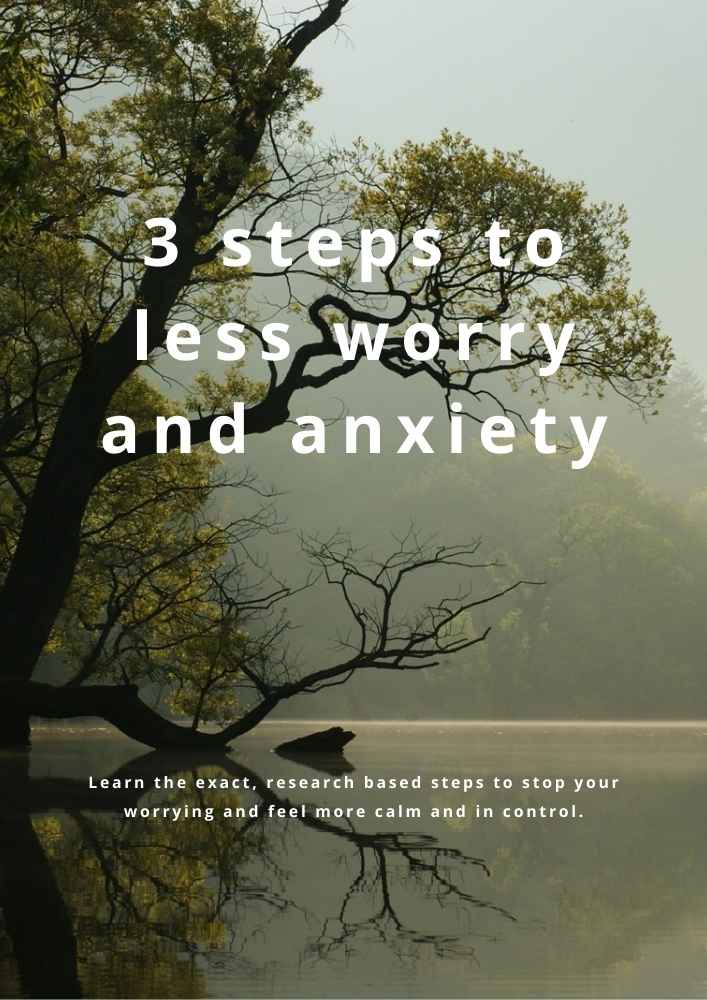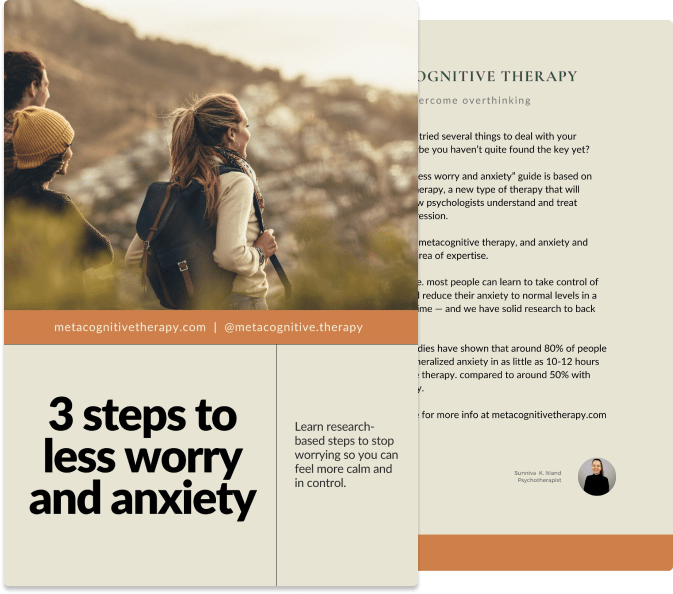Are you constantly worried about your mental health? Rethink mental health anxiety with MCT

Download our best tips on reducing anxiety and worrying
Learn three powerful metacognitive therapy steps to stop the worry cycle, reduce anxiety, and feel calmer in everyday life.
.jpeg)
.jpeg)
Mental health anxiety, or being afraid of mental illness, is a common experience — though most people don’t realize how widespread a problem it is, or when they're engaging in it.
If you have mental health anxiety, you likely feel persistent fear of developing a mental illness like depression, psychosis, or even suicidal ideation. This type of anxiety can show up as a transient worry for some, but for others, it becomes an overwhelming focus in their daily lives.
The fear of mental illness
Similarly to traditional health anxiety, where people worry excessively about physical illnesses, mental health anxiety fixates on the possibility of having a severe mental health condition. This can stem from a misunderstanding of how the mind works: Some people misinterpret normal negative emotions or thoughts as indicators of a looming mental disorder.
- Fleeting sadness
- A bout of brain fog
- A sense of detachment
- An unusual experience or sensation
- Existential worry
- A 'crazy' thought These experiences can all trigger intense rumination. What if this means I’m becoming depressed? What if I lose control or become psychotic?
This cycle of self-monitoring and constant checking only exacerbates anxiety. If you’re always scanning your mind and body for signs of distress, you’ll inevitably find something to latch onto, which reinforces your fears.
For example, if you’re scared of experiencing depression, you might wake up and immediately assess your mood, checking for any signs and deciding that you feel off. This sets off a cascade of worry and overanalysis, fuelling more anxiety and worry.

Download our best tips on reducing anxiety and worrying
Learn three powerful metacognitive therapy steps to stop the worry cycle, reduce anxiety, and feel calmer in everyday life.
The cost of coping strategies
People with mental health anxiety often develop coping strategies in an attempt to control their fears — but they usually backfire. These can look like;
- Excessive monitoring: Constantly checking your thoughts and feelings for signs of potential mental illness.
- Avoidance behaviours: Steering clear of certain situations, social interactions, or responsibilities to prevent emotional distress.
- Overcompensation: Rigidly practicing activities like mindfulness exercises, yoga, or self-care rituals with the primary goal of preventing negative emotions—only to become more distressed when these activities don’t provide ongoing relief.
- Rumination and problem-solving: Overanalyzing every thought and feeling in an effort to “figure out” what’s happening and how to fix it.
These coping techniques might provide a temporary sense of control, but they ultimately reinforce the belief that negative thoughts and emotions are dangerous and must be managed vigilantly, which further heightens anxiety. Coping strategies can cause hyperfixation on your mind: looking for signs of threats or distress causes you to notice every change and symptom, potentially interpreting them as dangerous. And searching for certain moods, like feelings of detachment, can result in maintaining those moods.
A new approach to mental health anxiety
Metacognitive Therapy (MCT) approaches mental health anxiety by shifting the focus away from specific thoughts, and instead towards how we relate to them.
According to MCT, negative thoughts and emotions themselves aren’t the problem — the way we respond to them is.
Common metacognitive beliefs that sustain mental health anxiety include:
- If I worry about my mental health, I can stay prepared and prevent it from worsening.
- Rumination will help me find solutions and avoid disaster.
- I can’t stop worrying.
- If I don't monitor my mind I might lose control or miss something important.
- Having thoughts of depression or psychosis means I am more likely to develop these conditions.
These beliefs drive people to remain hyper-focused on their mental state, keeping them trapped in a cycle of worry and rumination.
But what if I do become mentally ill?
Many people struggle with the idea that it would be irresponsible not to focus on their mental health if they do become depressed or get a diagnosis. The reality is, if you are dealing with a mental illness, will it actually help you to worry about it? Will worrying make you feel better or worse? Could it be that the things you're doing to try to avoid mental illness are actually maintaining your anxiety? What would it feel like to take a break from those worries and strategies for a few weeks?
Breaking the cycle with MCT
MCT encourages people to ask: Is the problem that I could become depressed or psychotic, or is the problem that I’m thinking too much about it?
This reframing can help people recognize that everyone is susceptible to mental health fluctuations, but most people don’t fixate on this. It’s the excessive engagement with these worries that creates suffering.
MCT helps those with mental health anxiety to let go of their maintaining strategies and develop a more detached relationship with their thoughts. Rather than constantly monitoring or analyzing their mental state, they learn to let thoughts come and go without assigning significance to them, so they can break free from the self-perpetuating anxiety cycle.
Mental health anxiety can feel overwhelming, but MCT offers a practical method for lasting relief. The key isn’t to eliminate negative thoughts or symptoms, but to change the way you respond to them. This ultimately helps people with mental health anxiety learn that they can coexist with uncertainty —just as the rest of the world does—without letting it dominate their lives.
If you’re looking for more support from an MCT-certified therapist, you can book a session here today.



